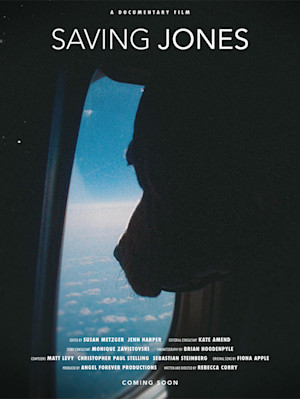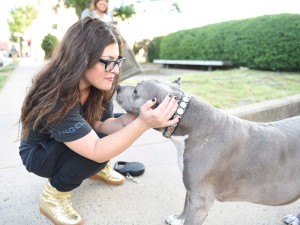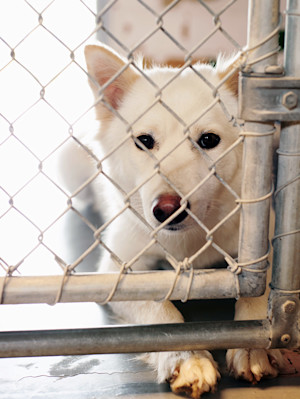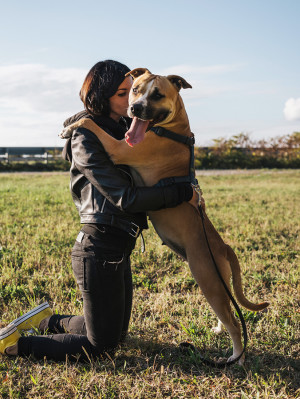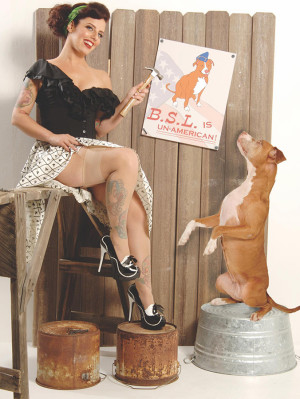Saving Jones Is an Essential Rescue Documentary—How You Can Make Sure More People See It
Get tickets to the September NYC screening now, and tell your favorite streamers to pick up this film.

Share Article
Rebecca Corry wrote and directed the new documentary Saving Jones for a reason that resonates with so many frustrated, heartbroken rescuers and animal welfare advocates across the country: Something has to change.
It’s no secret that the United States is in the midst of a nationwide crisis. Hundreds of thousands of dogs were euthanizedopens in new tab last year, and hundreds of thousands languish in shelters long-term, often in less-than-ideal conditions. And that’s not even to mention the estimated millions of animals opens in new tab who die of abuse, neglect, or cruelty every year in the U.S.
After years of working to raise awareness about and address this epidemic, especially among Pit Bull-type dogs (some of the most discriminated against and abused dogs of all), Corry — a comedian, actress, and executive director of the Stand Up For Pits Foundationopens in new tab — knew she had to try something different.
Saving Jones isn’t just a fact-based, informative film about this crisis, though it is that. It importantly makes the point that the animal welfare crisis is a human problem, that “what’s happening to these dogs is a direct reflection of us as a broken people and a broken society,” Corry tells us.

In June, we talked with Corryopens in new tab about Saving Jones’ premiere at the Dances With Films Festivalopens in new tab. Since then, the film has been enthusiastically received and will be screened next in New York City on September 8th. We followed up with Corry to learn more about the film, audiences’ reactions so far, and how potential viewers can advocate for the ability to see it.
This interview has been edited and condensed for clarity.
The movie recently premiered in L.A. What has the response been like so far?
We had our world premiere at the Dances With Filmsopens in new tab festival on June 22. The screening sold out, and we won the audience awardopens in new tab, which is an important award to receive because it reflects the impact the film has on audiences. We were very honored to win that, and look forward to the world getting to experience Saving Jones.
The response to the movie has far exceeded anything I could have imagined. In fact, people — not just people in animal welfare and animal rescue, but everyone — have been waiting for this truth to be told because it never has been before. We had a sold-out premiere, and I would say a quarter of that audience didn’t even have dogs.
In fact, after a screening of the film, a guy came up to me and said, “I just wanted you to know that my friend brought me, and I’ve been terrified of pit bull type dogs forever. I won’t pet them, I won’t look at them, I’m the one who would always say things about them. I’m never doing that again.” It was amazing, and that’s why this film can get distribution and will be seen by everyone.
You don’t have to be an animal lover or Pit Bull-type dog owner or advocate to appreciate this film; it’s for everyone. It’s impacting people who have only heard the ignorant and negative things the media has said about Pit Bulls for the past 40 years. It’s extremely impactful for them; they’re very emotional about it. It’s pretty amazing to see.
If people are interested in seeing the movie, is there anything they can do to advocate for it to be screened near them or more widely distributed?
Here’s what people can do to advocate for the film to be distributed: people can record a less than one minute video with or without their velvet hippos. Explain what these dogs mean to them and why Saving Jones, needs to be seen by the world, tag this publicationopens in new tab on Instagram, as well as the Saving Jones Instagram pageopens in new tab, and we will share. People can also go to the Saving Jones Instagram page and tag streaming platforms on our posts.
The movie will be shown next in New York City in September. Are there plans to screen it in the future or secure wider distribution?
The next screening is on September 8 at the Whitby Hotel in New York City; it’s a fundraiser and screener. There’s a good chance we’re going to be screening it again in October in Tacoma, Washington, and then we may screen again in Hollywood on November 3 before our Stand Up For Pits show. There is a strong possibility that we will be taking the film to several other international and domestic festivals.
But the priority is for the world to see it. There are things in motion that are making it possible for this film to get into the right hands and get distribution, and the goal is that it will land at a place that’s deserving enough to distribute it.
This movie, without question, has the power to create and inspire real change, save lives, and heal human beings. It already has. Any platform would be lucky to have it. If they’re smart, they’ll be fighting for it.
What inspired you to make this film?
The state of things as a society. Sadly, we are in a state of emergency. The United States is in a severe crisis for animals; millions of innocent dogs are being slaughtered. Our rescue system likes to say that they’re humanely euthanized; they are not.
[These dogs] might get a needle in their arm, but they are suffering and dying in shelters; they are being unjustly slaughtered, and they are not being cared for. It’s not just the shelter system, but society. The dumping of dogs, the disposable attitude, the fact that they’re being used for profit and entertainment. They’re not seen as sentient; they’re seen as property. It’s such a direct reflection of our society, and I find it shockingly horrifying.
It’s devastating to see that happen after fighting every day for 14 years to save [dogs]. When you work tirelessly, and you see things getting worse, you have to do something different.
Something needs to happen, and if the rescue community and the nonprofit sector could solve this problem, it would be solved already. They can’t, we can’t. We all have to do better, but we can’t do better unless we understand and recognize that what’s happening to these dogs is a direct reflection of us as a broken people and a broken society.
As you mentioned, you’ve worked in rescue for years as the founder of the Stand Up for Pits Foundation. Can you give us an example of what the animal welfare crisis you and your organization are fighting looks like right now?
The Stand Up For Pits Foundation is a national organization, based in Los Angeles. I can talk to you for hours about the things I see nationwide, but I’ll be specific today and focus on Los Angeles — Tinseltown, the land of dreams, where there’s all this privilege and power and money.
Mere minutes from Beverly Hills, one of the richest areas in the world, is Skid Row. Skid Row has thousands of homeless encampment residents, and in that encampment, there are also thousands of animals — Pit Bull-type dogs being beaten, starved, stabbed, shoved in cages on 124-degree days, laying in their own vomit, urine, foam – they’re foaming at the mouth.
I’m not saying that all [unhoused] people abuse their animals, because that is not true. Some of them will die for their animals. But what I am saying is that for many years, and it’s getting worse and worse every year, on Skid Row, there are Pit Bull-type dogs being openly bred, sold, stabbed, raped, starved, and dying out in the open.
That’s horrible. What is the city doing?
Staycee Dains of L.A. Animal Services opens in new tab knows about it and is actively doing nothing and actively denying help. My organization has offered to help Staycee and L.A. Animal Services remove the dogs being abused on Skid Row and offered resources and she continues to do nothing.
It’s intolerable, and their excuse is that our shelters are over capacity. Well, of course they are, because you’re doing nothing to solve the problem and dogs are being allowed to breed. Allowing dogs to suffer day in and day out for years on end because the shelters are full is not an excuse and one that will no longer be tolerated.
What is the core message of Saving Jones? How do you believe it addresses this crisis?
This film takes a really deep, hard, truthful, and honest look at our society and at humans and how abuse and discrimination does not know boundaries. It does not matter how many legs a being has; it’s all the same behavior, and it’s always the same result.
The concept of the direct correlation between animal abuse and human abuse is not new. As a matter of fact, there have been tonsopens in new tab and tonsopens in new tab of studies that proveopens in new tab that to be true. But there’s never been a feature-length documentary that tells that side of the story — that tells the absolute truth, based on facts, about how what is happening to Pit Bull-type dogs in this country and on this planet is a direct reflection of broken humans and a broken society. It’s not a “bad doggy” issue. That narrative is false and has grown tiresome. It’s a way to not take responsibility and avoid the truth.
What are some misconceptions you hope this movie corrects?
A lot of people like to say that what’s happening to Pit Bull-type dogs is happening because they’re mean, because they’re owned by “backwoods people” in the South or inner-city people. There are all these stupid stereotypes about them, these weird myths. Pit Bull-type dogs are the most abused, discriminated against, and murdered dogs on the planet because of a broken society and broken humans.
Human beings need to look at each other and go, “Wow, we’re the ones [who are] f***ed up.” It’s broken people doing broken things to these animals. The animals are voiceless victims, and the treatment of them is a symptom of a much bigger human problem.
But instead, society continues to blame and vilify the dogs instead of taking real action to make communities safer for humans and pets. It’s time for the stupidity and fear based ignorance to end and for humans to be held accountable for the horrors they have caused these dogs. When the focus is on who is holding the leash, only then will real change happen.
References:

Julie Zeilinger
Julie Zeilinger is a writer and editor whose writing has been published in Marie Claire, Forbes, Vox, HuffPost, and other publications. She is also the author of two books: College 101: A Girl’s Guide to Freshman Year (2014) and A Little F’d Up: Why Feminism Is Not a Dirty Word (2012). She has a two-year-old Bichpoo named Baloo and is a foster mom to dogs via Badass Animal Rescue.
Related articles
![Couple hugging their Pit Bull]()
What Is a Pit Bull, Exactly?
Everything you need to know about the five breeds dubbed “Pit Bulls.”
![taylour paige and her dogs]()
Zola Star Taylour Paige on How Her Dogs Taught Her About Love, Presence, and Patience
“Having dogs, rescue dogs, is not always convenient or comfortable — you have to get used to being uncomfortable. But it’s so worth it. The love is immeasurable.”
![Deirdre Franklin dressed as a pinup model holding one of her calendars while sitting on a wooden table next to a Pitbull dog sitting on its hind legs looking up at her]()
Pinups for Pitbulls Rolls Up the Victory Curls For the Pups Who Need It Most
Back in the day, pinup models donned their victory rolls to boost wartime spirits. Now, they do it to advocate for a much-maligned dog breed. Deirdre Franklin, the founder of Pinups for Pitbulls, explains how a burlesque hobby evolved into a life-saving non-profit.
![Happy couple and their pit bull dog together.]()
News Outlets Recklessly Give Pit Bulls a Bad Rap—Yet Again
Following the death of a California man last week, headlines only did further harm to Pit Bulls’ reputation.
![2 cute pit bull dogs laying next to each other on a blanket]()
BSL is Just Plain BS
Breed-specific legislation has profound impacts on families, their dogs, and animal welfare professionals.
![Yves, a man with a lot of tattoos and a brown paisley head bandana in tan pants holding his grey Pitbull dog who is wearing a tiny cowboy hat over his shoulder]()
The Misunderstood Pit Bull Is at the Top of Yves’s Advocacy List
The model, activist, and musician on his activism philosophy: “I’ve always been drawn to those who have been left behind, forgotten, misunderstood. I relate to them on a very deep, personal level. No matter how different you are, everyone deserves a chance.”
